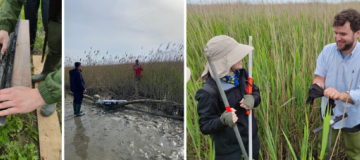
Isola della Batteria (Po Delta): a project to help this frail environment
31.10.2024

Deltas are among the largest depositional elements on Earth and are important from both ecological and economic perspectives. However, the continuous increase in extreme climate events, population growth, and human-induced subsidence seriously threaten the sustainability of many of the world's deltas.
The Isola della Batteria, in Pila di Rovigo, in the Po Delta, is an emblematic example of the transformations undergone by an environment suspended between land and water: from a thriving agricultural area and fishing valley to a submerged village due to land subsidence.
The project NatResPoNΔ, conducted by the Department of Geosciences of the Università degli Studi di Padova and the Institute of Geosciences and Earth Resources of the Consiglio Nazionale delle Ricerche, aims to verify the feasibility of "nature-based" solutions to increase the resilience of the Po Delta, ultimately mitigating long-term risks of floods and storms and ensuring the sustainability of local communities.
 |
The project is characterized by a multidisciplinary approach that combines sedimentological analysis, remote sensing, and numerical modeling. It is funded by the European Union as part of the Next Generation EU initiative and by the Italian Ministry of University and Research, under the PNRR program. In the video, Valentina Marzia Rossi, a researcher at IGG-CNR and Alvise Finotello, a researcher at the Department of Geosciences and PI of the project, explain more about it.





